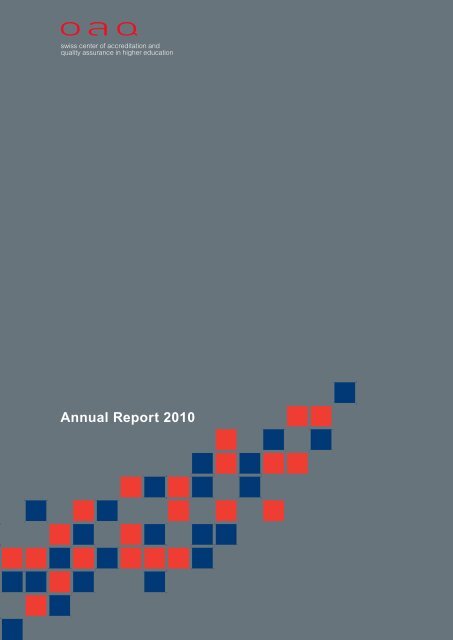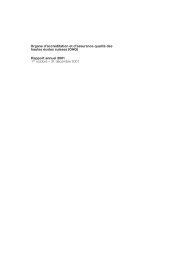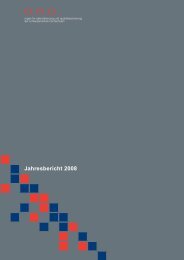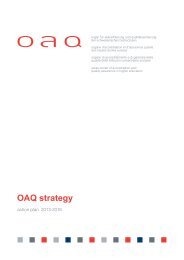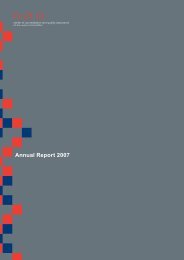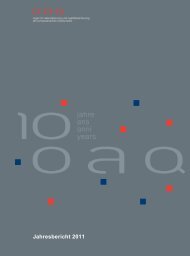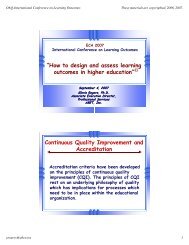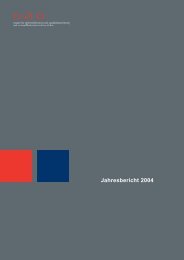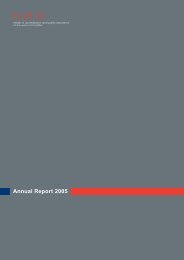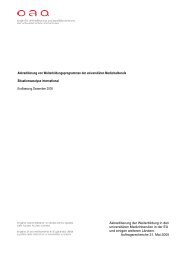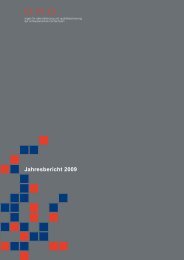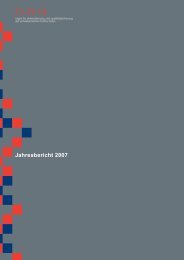Annual report 2010 PDF - OAQ Organ für Akkreditierung und ...
Annual report 2010 PDF - OAQ Organ für Akkreditierung und ...
Annual report 2010 PDF - OAQ Organ für Akkreditierung und ...
You also want an ePaper? Increase the reach of your titles
YUMPU automatically turns print PDFs into web optimized ePapers that Google loves.
<strong>Annual</strong> Report <strong>2010</strong>
Swiss Center of Accreditation and<br />
Quality Assurance in Higher Education (<strong>OAQ</strong>)<br />
<strong>Annual</strong> Report <strong>2010</strong>
Abbreviations<br />
AEC: European Association of Conservatoires<br />
ANQAHE: The Arab Network for Quality Assurance in Higher Education<br />
BAG: Federal Office of Public Health<br />
BBT: Federal Office for Professional Education and Technology<br />
BFH: Bern University of Applied Sciences<br />
CRUS: Rectors’ Conference of the Swiss Universities<br />
EAEVE: European Association of Establishments for Veterinary Education<br />
ECA: European Consortium for Accreditation in Higher Education<br />
EDI: Federal Department of Home Affairs<br />
EDK: Swiss Conference of Cantonal Ministers of Education<br />
ENIC: European Network of Information Centres in the European Region<br />
ENQA: European Association for Quality Assurance in Higher Education<br />
ESG: European Standards and Guidelines<br />
ESU: European Student’s Union<br />
EUA: European University Association<br />
EURASHE: European Association of Institutions in Higher Education<br />
EVD: Federal Department of Economic Affairs<br />
FHNW: University of Applied Sciences North Western Switzerland<br />
FHO: University of Applied Sciences Eastern Switzerland<br />
FHSG: Federal Act on Universities of Applied Sciences<br />
FHSG: St. Gallen University of Applied Sciences<br />
HES-SO: University of Applied Sciences Western Switzerland<br />
HFKG: Federal Act on the Promotion of Universities and Coordination in the<br />
Swiss Universities Sector<br />
HSLU: University of Lucerne<br />
IIEP: International Institute for Educational Planning<br />
JOQAR: Joint programmes: Quality Assurance and Recognition of Degrees Awarded<br />
INQAAHE: International Network for Quality Assurance Agencies in Higher Education<br />
KFH: Conference of Universities of Applied Sciences in Switzerland<br />
MedBG: Federal Law on University Medical Professions<br />
NARIC: National Academic Recognition Information Centres in the European Union<br />
QAST: Quality Assurance as a Tool for Strategic Management<br />
SBF: State Secretariat for Education and Research<br />
SUK: Swiss University Conference<br />
SUPSI: University of Applied Sciences of Italian-speaking Switzerland<br />
UFG: Act on the Promotion of Universities<br />
VSS: Federation of Swiss Students’ Unions<br />
ZHAW: Zurich University of Applied Sciences
Contents<br />
Preface 7<br />
1 Concise portrait <strong>OAQ</strong> – Activity area 9<br />
1.1 Universities 9<br />
1.2 Universities of Applied Sciences 9<br />
1.3 University medical professions 9<br />
1.4 Accreditation in Germany 9<br />
1.5 Official bodies of the <strong>OAQ</strong> 10<br />
2 Universities: retrospective and prospects 10<br />
2.1 Summary <strong>report</strong> on the quality audit cycle 2007/8 10<br />
2.2 <strong>2010</strong> procedures 11<br />
3 Universities of applied sciences: a dynamic accreditation landscape 11<br />
3.1 Accreditation procedures 11<br />
3.2 Evaluation procedures 12<br />
4 Medical professions: 49 postgraduate programmes reviewed 13<br />
4.1 Basic medical education 13<br />
4.2 Postgraduate medical education 13<br />
5 Accreditations in Germany: new horizons 14<br />
6 National cooperation 14<br />
6.1 Overview 14<br />
6.2 Swiss Universities Quality Network 15<br />
6.3 Cooperation with VSS and the students’ accreditation pool 15<br />
7 International cooperation 15<br />
8 Information and communication 16<br />
8.1 Performance of the information & communication mandate 16<br />
9 Finances 17<br />
9.1 Balance sheet & income statement <strong>2010</strong> 17<br />
9.2 Auditors’ <strong>report</strong> 20<br />
10 Programme for the year 2011 21<br />
10.1 Quality reviews 2011 21<br />
10.2 International 22<br />
Annexes 23<br />
<strong>Annual</strong> Report <strong>2010</strong><br />
5
Preface<br />
The <strong>report</strong>ing year <strong>2010</strong> saw changes in the management of the <strong>OAQ</strong> and a great many<br />
procedures.<br />
In May <strong>2010</strong>, the interim director, Dr. Paul Zinsli, handed a well-ordered house over to the<br />
<strong>und</strong>ersigned. The <strong>OAQ</strong> used this change as an opportunity to review its strategy and aims<br />
at a chaired workshop, one of its objectives being to become fit for purpose after the entry<br />
into force of the Federal Act on the Promotion of Universities and Coordination in the Swiss<br />
Universities Sector (HFKG).<br />
True to the principle that controllers must themselves be controlled, the <strong>OAQ</strong> will <strong>und</strong>ergo<br />
a stringent external evaluation in 2011: in August <strong>2010</strong>, the <strong>OAQ</strong> applied for the renewal<br />
of its membership of the European Association for Quality Assurance in Higher Education<br />
(ENQA). One criterion for ENQA membership is an external assessment of the <strong>OAQ</strong> for<br />
compliance with the European Standards and Guidelines in Quality Assurance (ESG),<br />
which set out the minimum requirements for quality assurance and accreditation at Euro-<br />
pean level.<br />
In the year <strong>und</strong>er review, the procedures focused on accreditation of postgraduate med-<br />
ical programmes on the basis of the Medical Professions Act and on behalf of the<br />
Federal Office of Public Health (FOPH). During the year, the <strong>OAQ</strong> conducted a total of<br />
50 procedures in the medical sector.<br />
A second area on which the procedures focussed was that of the universities of applied<br />
sciences with a total of 16 procedures.<br />
In the universities sector, the <strong>OAQ</strong> conducted three procedures in <strong>2010</strong>. The synthesis<br />
<strong>report</strong> on the Quality Audits 2007/8, which the <strong>OAQ</strong> completed in December <strong>2010</strong> in order<br />
to be considered for the meeting of the Swiss Universities Conference (SUC) in January<br />
2011, brought the second cycle of Quality Audits to a conclusion as far as the role of the<br />
<strong>OAQ</strong> was concerned.<br />
After the <strong>OAQ</strong> had obtained definitive recognition by the German Accreditation Council<br />
for Procedures in Germany, negotiations were put in hand with two prestigious universities<br />
on a system accreditation. Both procedures are expected to begin in the second half of<br />
2011.<br />
Dr. Christoph Grolim<strong>und</strong><br />
Director<br />
<strong>Annual</strong> Report <strong>2010</strong><br />
7
8 <strong>Annual</strong> Report <strong>2010</strong>
1 Concise portrait <strong>OAQ</strong> – Activity area<br />
1.1 Universities<br />
The Act on the Promotion of Universities (UFG) and the inter-cantonal Concordat on uni-<br />
versity coordination and the agreement between the Confederation and the university can-<br />
tons on cooperation in the university sector both entrusted the Center for Accreditation and<br />
Quality Assurance <strong>OAQ</strong> with the task of safeguarding and improving teaching quality at<br />
Swiss universities.<br />
The <strong>OAQ</strong> performs various quality assurance and accreditation tasks on behalf of the<br />
Swiss University Conference (SUC): it draws up guidelines and quality standards for<br />
accreditation in the Swiss university sector and performs accreditation procedures for<br />
Swiss universities of all kinds. In addition, the <strong>OAQ</strong> assures international networking and<br />
cooperation in the area of accreditation and quality assurance.<br />
For the State Secretariat for Education and Research (SER), the <strong>OAQ</strong> determines eligibil-<br />
ity for recognition <strong>und</strong>er contribution law based on the procedures laid down in the act on<br />
the promotion of universities. In this connection, quality audits take place at the cantonal<br />
universities once every four years.<br />
1.2 Universities of Applied Sciences<br />
The accreditation system for universities of applied sciences is based on the Federal Act<br />
on Universities of Applied Sciences (FHSG). That act prescribes the accreditation of uni-<br />
versities of applied sciences and the courses offered by them. Since January 2008, the<br />
<strong>OAQ</strong> has been recognized by the Federal Department of Economic Affairs (FDEA) for the<br />
performance of accreditation procedures. The decisions are taken by the FDEA.<br />
1.3 University medical professions<br />
The accreditation of basic and postgraduate medical programmes which lead up to a<br />
Swiss Federal diploma or a postgraduate title in human, dental and veterinary medicine<br />
and also in chiropractic and pharmacy is compulsory <strong>und</strong>er the provisions of the Federal<br />
Law on the University Medical Professions (MedBG).<br />
Decisions on medical training (Bachelor’s, Master’s degree) fall within the terms of refer-<br />
ence of an independent accreditation entity set up specially for this purpose, the Swiss<br />
Accreditation Council and the SUC. Decisions on postgraduate medical programmes fall<br />
within the scope of responsibility of the Federal Department of Home Affairs (FDHA).<br />
1.4 Accreditation in Germany<br />
At the invitation of the German Accreditation Council, the <strong>OAQ</strong> applied for authorization in<br />
Germany in 2009 and became the first foreign agency to be licensed to perform system<br />
accreditations and the accreditation of study programmes in Germany.<br />
Decisions on the procedures at German universities are taken by the accreditation com-<br />
mission of the <strong>OAQ</strong>.<br />
<strong>Annual</strong> Report <strong>2010</strong><br />
9
10 <strong>Annual</strong> Report <strong>2010</strong><br />
1.5 Official bodies of the <strong>OAQ</strong><br />
The business office of the <strong>OAQ</strong> is assisted in several activity areas by professional scien-<br />
tific advisory bodies. These advisory bodies (see Annex 1) are responsible for assuring<br />
scientific quality and ensure that the procedures used comply with international standards.<br />
Procedures <strong>und</strong>er the Federal Law on the University Medical Professions are additionally<br />
accompanied by the Medical Professions Commission for which provision is made in the<br />
Act.<br />
2 Universities: retrospective and prospects<br />
2.1 Summary <strong>report</strong> on the quality audit cycle 2007/8<br />
Regular assessment of the internal quality assurance systems of the public university<br />
institutions in Switzerland is a compulsory quality assurance measure. At the same time, it<br />
is also a requirement to qualify for contributions from the Federal authorities.<br />
In the years 2003/4 and 2007/8, the <strong>OAQ</strong>, acting on behalf of the State Secretariat for<br />
Education and Research, performed quality audits designed to assess the internal quality<br />
assurance systems of the public universities.<br />
Reflecting its own quality assurance principles, the <strong>OAQ</strong> drew up a summary <strong>report</strong> at the<br />
conclusion of the second cycle which analyses the outcomes and evaluates feedback on<br />
content and procedural techniques by various stakeholders. The <strong>report</strong> is based upon<br />
standardized feedback forms which are completed by the universities and by the experts<br />
participating in the procedures, as well as subsequent discussions between the <strong>OAQ</strong> and<br />
the universities. In addition, feedback from the Swiss Q-Network was incorporated into the<br />
summary.<br />
The most important finding must surely be that the universities have accepted the quality<br />
audits overall and regard them as a contribution to institutional quality improvement. The<br />
experts for their part noted substantial development by comparison with the first quality<br />
audit cycle dating back to 2003/4.<br />
The quality assurance (QA) strategy was therefore embodied almost everywhere in a high<br />
level strategy for the universities. The creation of QA commissions and the appointment of<br />
QA managers, together with the implementation of coordinated QA mechanisms, must be<br />
regarded as the expression of a real cultural change.<br />
Room for improvement was fo<strong>und</strong> to exist in the knowledge and <strong>und</strong>erstanding of the<br />
persons who were questioned during the site visits about the procedures themselves and<br />
the role of the <strong>OAQ</strong>. More intensive efforts will have to be made by the <strong>OAQ</strong> to publicize<br />
the Swiss system of external quality assurance and the way in which it is embedded in the<br />
European QA landscape. In this context, the <strong>OAQ</strong> is also endeavouring to facilitate publi-<br />
cation of the outcomes.
A second aspect with which the <strong>OAQ</strong> will deal differently in future procedures is the com-<br />
position of the groups of experts. In future, the presence of QA specialists in the expert<br />
teams will be smaller. This is because expert groups are to consist of peers, i.e. experts<br />
who benefit from comparable professional knowledge, comparable experience and per-<br />
form comparable tasks in a comparable context.<br />
All in all, the second ro<strong>und</strong> of the Quality Audits confirmed the fact that external quality<br />
assurance is successful thanks to an institutional approach which respects the autonomy<br />
of the universities. The experience gathered from the 2007/8 cycle also provides an impor-<br />
tant contribution to the development of institutional accreditation for which provision is<br />
made in the draft text of a Federal Act on the Promotion of Universities and Coordination<br />
in the Swiss Universities Sector (HFKG).<br />
The summary <strong>report</strong> is published at www.oaq.ch<br />
2.2 <strong>2010</strong> procedures<br />
In the year <strong>und</strong>er review, the <strong>OAQ</strong> conducted three accreditation procedures and two<br />
formal reviews of compliance with imposed conditions.<br />
In addition, the <strong>OAQ</strong> <strong>und</strong>ertook preliminary reviews of private institutions and three proce-<br />
dures for the purpose of recognition <strong>und</strong>er contribution law pursuant to the Act on the<br />
Promotion of Universities (UFG) for the State Secretariat for Education and Research.<br />
On behalf of the Principality of Liechtenstein, the <strong>OAQ</strong> also performed an institutional<br />
evaluation of the University of Liechtenstein which ended with a positive outcome.<br />
3 Universities of applied sciences: a dynamic accreditation landscape<br />
3.1 Accreditation procedures<br />
The <strong>OAQ</strong> conducted 16 programme accreditations at universities of applied sciences<br />
pursuant to the accreditation directives of the Federal Department of Economic Affairs for<br />
universities of applied sciences.<br />
Because of the statutory requirement which stipulates that most master’s degree courses<br />
must be accredited by 2011, several universities of applied sciences submitted applica-<br />
tions in the year <strong>und</strong>er review to the <strong>OAQ</strong> for accreditation of their master’s courses. Two<br />
major cooperation projects were a special feature here:<br />
Firstly, the MSc in Engineering (MSE), a course developed jointly by the seven Swiss uni-<br />
versities of applied sciences established <strong>und</strong>er public law (Bern University of Applied<br />
Sciences - BFH, University of Applied Sciences North Western Switzerland - FHNW, Uni-<br />
versity of Applied Sciences Eastern Switzerland - FHO, Lucerne University - HSLU, Uni-<br />
versity of Applied Sciences of Italian-speaking Switzerland - SUPSI, Zurich University of<br />
Applied Sciences - ZHAW, and the University of Applied Sciences Western Switzerland -<br />
<strong>Annual</strong> Report <strong>2010</strong><br />
11
12 <strong>Annual</strong> Report <strong>2010</strong><br />
HES-SO) <strong>und</strong>er which students are able to pursue their studies at the university of applied<br />
sciences of their own choice.<br />
However, the accreditation procedure only concerned the BFH, FHNW, ZHAW, FHO, HSLU<br />
and SUPSI; the MSE course modules offered at the HES-SO will be accredited at a later<br />
date.<br />
For this accreditation procedure, the <strong>OAQ</strong> appointed four teams of experts. On the first<br />
assessment day, the “central” modules of the MSE were discussed in Zurich. On the fol-<br />
lowing days, the groups of experts travelled to the various sites of the other universities of<br />
applied sciences in order to assess aspects of the in-depth specialized studies.<br />
The MSc in social work is another course of study developed jointly by four universities of<br />
applied sciences in the German-speaking part of Switzerland (Bern University of Applied<br />
Sciences – BFH, Lucerne University – HSLU, University of Applied Sciences St. Gallen –<br />
FHSG and Zurich University of Applied Sciences – ZHAW). The assessments of the dif-<br />
ferent sites were conducted in the space of a single week by the same group of experts.<br />
These two major accreditation projects not only presented the participating universities of<br />
applied sciences with considerable challenges, but also gave the <strong>OAQ</strong> an opportunity to<br />
take part in innovative university course offerings in the external quality assurance frame-<br />
work. Experience gained through these procedures, which remains to be the subject of a<br />
definitive analysis, will help to allow further development of the methodology of complex<br />
quality assurance procedures.<br />
In the year <strong>und</strong>er review, the <strong>OAQ</strong> also examined a number of music programmes in com-<br />
bined procedures: at the SUPSI Conservatoire (4 Masters), at the HES-SO (4 Masters),<br />
and at the FHNW Music or Basel University of Music and Scuola Cantorum Basiliensis<br />
(4 Masters, 1 Bachelor). These procedures were implemented jointly with the European<br />
Association of Conservatoires (AEC) in line with the particular needs of the participating<br />
institutions.<br />
In addition, formal verifications of compliance with the stipulated conditions were also<br />
performed: courses which are accredited subject to compliance with certain conditions<br />
must satisfy these requirements within the statutory period (generally, 12 months after<br />
submission of the ruling of the Federal Department of Economic Affairs). If the outcome<br />
of the review is positive, the course will be accredited without reservation. If the require-<br />
ments are not met, accreditation will be cancelled. For this purpose, the <strong>OAQ</strong> mandates<br />
two experts in each case who analyse the <strong>report</strong> on compliance with the requirements by<br />
the particular university of applied sciences and draw up an expert opinion on such com-<br />
pliance for the attention of the Federal Office for Professional Education and Technology<br />
(OPET). In the year <strong>und</strong>er review, the <strong>OAQ</strong> performed a total of 9 formal procedures of<br />
verification of compliance with conditions; in three cases, a one-day on-site visit was made<br />
in addition to a review of the dossier.<br />
3.2 Evaluation procedures<br />
The quality assurance procedures covering courses of advanced education at the univer-<br />
sities of applied sciences are not accreditation procedures in the strict sense of the term<br />
as there is no statutory basis for an accreditation decision. Instead, continuing education
programmes which have successfully <strong>und</strong>ergone a review qualify for an <strong>OAQ</strong> quality label<br />
(“<strong>OAQ</strong> evaluated”). One such evaluation procedure was conducted in the year <strong>und</strong>er<br />
review.<br />
4 Medical professions: 49 postgraduate programmes reviewed<br />
The quality assurance procedures covering courses of advanced education at the univer-<br />
sities of applied sciences are not accreditation procedures in the strict sense of the term<br />
as there is no statutory basis for an accreditation decision. Instead, continuing education<br />
programmes which have successfully <strong>und</strong>ergone a review qualify for an <strong>OAQ</strong> quality label<br />
(“<strong>OAQ</strong> evaluated”). One such evaluation procedure was conducted in the year <strong>und</strong>er<br />
review.<br />
4.1 Basic medical education<br />
The university courses which lead up to a federal diploma according to the Medical Profes-<br />
sions Act must be accredited by 31 August 2012. This concerns the programmes in the<br />
fields of human and dental medicine, chiropractic and pharmacy. The Federal Office of<br />
Public Health (FOPH) entrusted the <strong>OAQ</strong> with the task of preparing and implementing<br />
these accreditation procedures.<br />
After the preliminary work (development of quality standards and guidelines) had been<br />
completed in 2009, the <strong>OAQ</strong> <strong>und</strong>ertook the procedural work as such in medical training in<br />
the year <strong>und</strong>er review. A total of 15 procedures at seven universities will be completed on<br />
a phased basis and brought to a conclusion at the end of 2012. The procedure in chiro-<br />
practic at Zurich University is an exception and the accreditation decision is expected to<br />
be issued in May 2013.<br />
In a first procedure, the <strong>OAQ</strong>, working in cooperation with the European Association of<br />
Establishments for Veterinary Education (EAEVE), made a joint review of the course in<br />
veterinary medicine (Bern and Zurich) pursuant to the provisions of MedBG, UFG and<br />
EAEVE. The on-site visit with international experts took place in September <strong>2010</strong>, and the<br />
decision of the two accreditation authorities (SUC and Swiss Accreditation Council) is<br />
expected in April 2011 or May 2011.<br />
4.2 Postgraduate medical education<br />
The performance of the accreditation procedures for advanced medical training was a<br />
focus of the <strong>OAQ</strong> business activity in <strong>2010</strong>: all 44 courses of advanced training in human<br />
medicine, 4 advanced training courses in dental medicine and one advanced training<br />
course in chiropractic <strong>und</strong>erwent a review. To assure completion of the task on schedule,<br />
all the scientific staff of the <strong>OAQ</strong> were involved in the performance of these procedures.<br />
For the external review, the <strong>OAQ</strong> appointed in each case teams of two experts (indepen-<br />
dent professional experts drawn from the discipline concerned) who prepared an official<br />
opinion on the basis of the self-assessment <strong>report</strong>s of the professional societies. In some<br />
<strong>Annual</strong> Report <strong>2010</strong><br />
13
14 <strong>Annual</strong> Report <strong>2010</strong><br />
cases, on-site visits were made to advanced training establishments. On the basis of the<br />
self-assessment <strong>report</strong>s and the <strong>report</strong>s by the experts, the <strong>OAQ</strong> drafted a final <strong>report</strong> with<br />
an accreditation recommendation for each course of advanced training for the attention<br />
of the Federal Office of Public Health. The last <strong>report</strong>s will be completed in the early part<br />
of 2011.<br />
5 Accreditations in Germany: new horizons<br />
Since June 2009, the <strong>OAQ</strong> has been the first foreign agency authorized to perform system<br />
and programme accreditations in Germany and to award the quality seal of the German<br />
Accreditation Council. For this new activity area on the international scene, the <strong>OAQ</strong> ded-<br />
icated its work intensively to the development of the necessary instruments such as pro-<br />
cedural guidelines etc.<br />
An accreditation commission appointed specially for the international procedures accom-<br />
panied the <strong>OAQ</strong> in the definition of the instruments and planning of the procedures and<br />
will take the necessary accreditation decisions. The commission has an international com-<br />
position. One representative of the students and two representatives of the professional<br />
world have a seat on this commission. To ensure coherence between the national and<br />
international procedures of the <strong>OAQ</strong>, members of the scientific advisory board for univer-<br />
sities and for universities of applied sciences were invited to join the commission (see<br />
Annex 1).<br />
As the relatively new system accreditation in Germany aims to ensure the conduct of an<br />
institutional review and the <strong>OAQ</strong> has great experience in this particular field through the<br />
two Swiss quality audit cycles, a number of enquiries were already made to the <strong>OAQ</strong><br />
shortly after it was granted authorization. The <strong>OAQ</strong> has held discussions with a number of<br />
German universities and will begin a procedure for system accreditation at the Excellence<br />
University in Stuttgart in the summer of 2011. Another system accreditation procedure to<br />
begin in the second half of 2011 is currently being planned.<br />
The knowledge which the <strong>OAQ</strong> will acquire with the preparation and implementation of the<br />
procedures in Germany and the lively exchange with the German agencies will prove use-<br />
ful to the development of institutional accreditation in Switzerland within the framework of<br />
the HFKG law.<br />
6 National cooperation<br />
6.1 Overview<br />
The main national partners of the <strong>OAQ</strong> are the Swiss University Conference (SUC), the<br />
Rectors’ Conference of the Swiss Universities (CRUS), the Conference of Universities of
Applied Sciences in Switzerland (KFH), the Federation of Swiss Students‘ Unions (VSS),<br />
the Swiss Conference of Cantonal Directors of Education (EDK) and the appropriate<br />
Federal agencies: the State Secretariat for Education and Research (SER), the Federal<br />
Office for Professional Education and Technology (OPET) and the Federal Office of Public<br />
Health (FOPH). A tabular summary of national cooperation by the <strong>OAQ</strong> will be fo<strong>und</strong> in<br />
Annex 4.<br />
6.2 Swiss Universities Quality Network<br />
The Swiss Q-Network was set up at the initiative of the <strong>OAQ</strong> in the year 2003 and has<br />
received a formal mandate from the CRUS. It is headed up by a member of the Rectorate<br />
of Lausanne University and comprises three internal working groups (working groups for<br />
institutional accreditation, on the situation of students and on good practices in quality<br />
assurance). Members of this network are the quality managers of the cantonal universi-<br />
ties and the two ETH (Swiss Federal Institutes of Technology), together with representa-<br />
tives of the CRUS, the students’ organizations and the <strong>OAQ</strong>.<br />
6.3 Cooperation with the VSS and the students’ accreditation pool<br />
For a number of years, the <strong>OAQ</strong> has maintained relations with the Federation of Swiss<br />
Students’ Unions (VSS). Cooperation is based partly on the regular use of student experts<br />
in <strong>OAQ</strong> procedures. These students are appointed via the students’ accreditation pool<br />
which was fo<strong>und</strong>ed jointly by the <strong>OAQ</strong> and VSS in the year 2007. The pool comprises<br />
students in all the disciplines at a number of Swiss universities of all kinds (both general<br />
and universities of applied sciences). The student experts are trained jointly by the <strong>OAQ</strong><br />
and VSS before they take full part in a procedure. A training workshop was held in the year<br />
<strong>und</strong>er review <strong>2010</strong>.<br />
7 International cooperation<br />
The <strong>OAQ</strong> is a national agency with a national mandate. To perform this mandate to the<br />
requisite standard, international networking and cooperation are of great importance.<br />
The <strong>OAQ</strong> is very active in European and international networks: since 2004, it has been a<br />
member of the European Consortium of Accreditation ECA, a consortium of 17 European<br />
accreditation agencies and since 2006 a full member of the European Association for<br />
Quality Assurance in Higher Education (ENQA). With its 47 members and 21 associated<br />
organizations, ENQA represents the interests of quality assurance agencies in Europe. In<br />
addition, the <strong>OAQ</strong> is networked with the European University Association (EUA), which is<br />
dedicated to the interests of the European universities and the European Association of<br />
Institutions in Higher Education (EURASHE), which looks after the interests of European<br />
universities of applied sciences.<br />
The motivation for cooperation between the <strong>OAQ</strong> and the ECA resides in the opportunity for<br />
disseminating and exchanging experience in the area of accreditation and in ensuring<br />
<strong>Annual</strong> Report <strong>2010</strong><br />
15
16 <strong>Annual</strong> Report <strong>2010</strong><br />
international transparency of quality assurance work in the tertiary sector. Through con-<br />
tacts with other ECA members, the <strong>OAQ</strong> has succeeded in building up a pool of interna-<br />
tional experts drawn from all kinds of university disciplines. Experience gathered via the<br />
ECA working groups enables the <strong>OAQ</strong> to develop its procedural cycles and instruments<br />
constantly in compliance with the international best practices.<br />
Together with EUA, EURASHE and ESU (the European Student Union), ENQA forms the E4<br />
Group which is the representation of the political interests of universities, students and<br />
quality assurance agencies in Europe. ENQA therefore provides an essential framework for<br />
networking with all the interest representatives and hence for a professional dialogue and<br />
exchange. The <strong>OAQ</strong> plays an active part in ENQA workshops and works to implement<br />
European Standards and Guidelines (ESG) in Switzerland. In addition, the <strong>OAQ</strong> is repre-<br />
sented on the Internal Quality Assurance Committee of ENQA which aims to exchange<br />
good practices in the area of the internal quality assurance of agencies.<br />
The <strong>OAQ</strong> is also a member of the global International Network for Quality Assurance Agen-<br />
cies in Higher Education (INQAAHE), which comprises some 200 organizations from all<br />
over the world, including most of the QA agencies. This membership also enables the <strong>OAQ</strong><br />
to establish important international contacts – and a number of experts have already been<br />
involved in procedures in Switzerland.<br />
8 Information and communication<br />
8.1 Performance of the information & communication mandate<br />
The <strong>OAQ</strong> regards information and communication as an integral part of its work and advo-<br />
cates an open and transparent information and communication. According to this principle,<br />
positive accreditation decisions are published on the website. For the procedures concern-<br />
ing universities, the expert opinion and final <strong>OAQ</strong> <strong>report</strong> are also published – after consul-<br />
tation with the particular institution concerned. A legal basis is, however, lacking for the<br />
publication of negative decisions and the <strong>OAQ</strong> also gives no information about procedures<br />
which have been withdrawn.<br />
The accredited institutions/study programmes receive an electronic version of an accred-<br />
itation seal from the <strong>OAQ</strong> for use on their own website or on their printed matter.<br />
The <strong>OAQ</strong> issues its publications in the three Swiss national languages and in English. All<br />
the instruments are available for downloading in <strong>PDF</strong> format on the four-language website.
9 Finances<br />
9.1 Balance sheet and income statement <strong>2010</strong><br />
Balance sheet as of 31 December <strong>2010</strong><br />
Assets CHF<br />
Cash 1 030.70<br />
EEK current account, BEKB savings account 672 515.21<br />
Receivables & withholding tax receivables 19 669.30<br />
Valiant Bank, rental guarantee 15 285.55<br />
Expenses prepaid 32 135.80<br />
Work in progress for third party mandates inc. private accreditations 765 817.05<br />
Total assets 1 506 453.61<br />
Liabilities<br />
Payables -95 098.05<br />
Liability to university cantons -71 014.80<br />
Advance payments -846 983.45<br />
Income received in advance -61 719.55<br />
Balance sheet surplus -431 637.76<br />
Total liabilities -1 506 453.61<br />
Income statement 1 January <strong>2010</strong> to 31 December <strong>2010</strong><br />
Expenditure CHF<br />
Personnel expenditure inc. social benefits and advisory board fees -1 550 782.30<br />
Public relations, website, corporate identity -20 278.35<br />
Business operations<br />
Rental and maintenance -96 743.70<br />
Repairs and technical acquisitions (EDP, database, telephone) -81 089.65<br />
Property insurance, energy, administrative and IT expenditure -97 085.75<br />
<strong>Organ</strong>ization of conferences and workshops 0.00<br />
Costs of accreditation (performance, documents, translations, legal dept.) -823 403.95<br />
S<strong>und</strong>ry and contingencies -22 591.20<br />
Financial result 560.42<br />
Total expenditure -2 691 414.48<br />
Surplus for the year -297 524.37<br />
Total -2 988 938.85<br />
<strong>Annual</strong> Report <strong>2010</strong><br />
17
18 <strong>Annual</strong> Report <strong>2010</strong><br />
Income<br />
Contributions<br />
Canton BS 104 279.00<br />
Canton BE 138 267.00<br />
Canton FR 78 420.00<br />
Canton GE 147 064.00<br />
Canton. NE 35 381.00<br />
Canton SG 43 206.00<br />
Canton TI 19 466.00<br />
Canton. VD 101 648.00<br />
Canton ZH 233 411.00<br />
Canton LU 14 063.00<br />
Confederation 915 205.00<br />
Accreditations/evaluations of universities of applied sciences 635 492.65<br />
Accreditations/private sector evaluations 8 608.20<br />
Services to third parties/Medicine agreement 508 805.55<br />
Workshop and contributions 5 622.45<br />
Total 2 988 938.85<br />
The full cost of work performed by the <strong>OAQ</strong> on behalf of third parties, i.e. not on behalf<br />
of the SUC, is billed to the client. This relates in particular to all accreditations <strong>und</strong>er the<br />
Federal law on University Medical Professions, accreditations for universities of applied<br />
sciences and the accreditation of private university providers.<br />
The <strong>OAQ</strong> ended the year <strong>und</strong>er review with a positive result of CHF 297,524 (CHF 191,878<br />
in the previous year) on total income of CHF 2,988,939 (CHF 2,358,070 in the previous year).<br />
The positive annual financial statement for 2009 was attributable in the first instance to a<br />
stringent cost-cutting programme, while the development of work for third parties was a<br />
further feature of the financial year <strong>2010</strong>. Both staff costs and operating expenditure<br />
(excluding accreditations) were higher in <strong>2010</strong> than in the previous year.<br />
At CHF 1,550,782, personnel expenditure is only marginally higher than in the previous<br />
year (CHF 1,540,299) because the increased personnel costs brought about by legal<br />
stipulations were practically offset by staff turnover.<br />
In the year <strong>und</strong>er review, operating expenditure without accreditations stood at CHF<br />
317,789 (previous year: CHF 290,234).<br />
On the other hand, expenditure on accreditations (all external costs connected with pro-<br />
cedures such as costs and fees of experts, translations etc.) reached CHF 823,404 in<br />
<strong>2010</strong> (against CHF 340,763 in the previous year). Of this total, CHF 390,937 (CHF 145,896<br />
in the previous year) were incurred for procedures concerning universities of applied<br />
sciences, CHF 332,241 (CHF 29,146 in the previous year) for procedures <strong>und</strong>er the Fed-<br />
eral law on university medical professions and CHF 500 (CHF 5,000 in the previous year)<br />
for the accreditation of private university establishments.
The annual financial statement therefore shows a clear shift of activities towards the sec-<br />
tor of universities of applied sciences and the medical professions. While accreditation<br />
of postgraduate programmes for specialist physicians in human medicine, dental medi-<br />
cine and chiropractic were budgeted, more demands than expected were received for<br />
accreditation of universities of applied sciences and their programmes. Income of CHF<br />
520,000 was stated in the budget, but in fact revenue from accreditations in the sector of<br />
universities of applied sciences reached CHF 635,493 (previous year CHF 361,069).<br />
The surplus of CHF 297,524 on the budget for the year <strong>2010</strong> and the balance sheet sur-<br />
plus of CHF 134,113 as of 31.12.2009 result in an overall surplus of CHF 431,638.<br />
At CHF 765,817, the assets side shows a significantly higher amount for work in progress<br />
than in the previous year (CHF 429,028). CHF 536,286 alone were accounted for by the<br />
accreditation cycle for postgraduate medical education scheduled over a period of two<br />
years and ending in the spring of 2011. At CHF 227,480, work in progress in the sector<br />
of universities of applied sciences is broadly similar to the previous year’s figure (CHF<br />
208,327).<br />
<strong>Annual</strong> Report <strong>2010</strong><br />
19
20 <strong>Annual</strong> Report <strong>2010</strong><br />
9.2 Auditors' Report
10 Programme for the year 2011<br />
10.1 Quality reviews 2011<br />
The first re-accreditations in the university sector are due to be performed in 2011 as the<br />
accreditations of institutions and study programmes dating back to 2004 will then lapse<br />
and have to be renewed.<br />
With a view to the forthcoming entry into force of the HFKG, the Secretariat of State will at<br />
least provisionally refrain from the performance of a third ro<strong>und</strong> of quality audits in the<br />
years 2011/2012; this work is therefore suspended.<br />
In the area of procedures <strong>und</strong>er the Federal law on university medical professions, the<br />
emphasis in 2011 will be on the cycle of accreditation of medical education (veterinary<br />
medicine, human medicine, dental medicine and chiropractic). The <strong>OAQ</strong> will be perform-<br />
ing a total of 13 procedures with on-site visits; the procedure in the sector of veterinary<br />
medicine was already completed in <strong>2010</strong> and the chiropractic procedure is not due to<br />
begin until 2012.<br />
In 2011 the <strong>OAQ</strong> will also put in hand preliminary work (i.e. development of quality stan-<br />
dards and guidelines) for the accreditation of postgraduate education in public pharma-<br />
cies and hospital pharmacies on behalf of the FOPH.<br />
With a view to the entry into force of the law on the psychology professions, the <strong>OAQ</strong> will<br />
accompany preparations in 2011 and 2012 for accreditation of the psychology profes-<br />
sions by the FOPH.<br />
The compulsory accreditation of authorized master’s study courses at universities of<br />
applied sciences will be largely completed in 2011. The testing programme includes an<br />
institutional accreditation of a ninth private university of applied sciences, several accred-<br />
itations of masters’ programs and the examination of a series of continuing education<br />
programmes (Master of Advanced Studies).<br />
In Germany, the <strong>OAQ</strong> will be starting a first procedure for system accreditation at the<br />
University of Stuttgart in the summer of 2011. Negotiations are in progress on a second<br />
procedure due to begin in the second half of 2011.<br />
<strong>Annual</strong> Report <strong>2010</strong><br />
21
22 <strong>Annual</strong> Report <strong>2010</strong><br />
10.2 International<br />
The review of the <strong>OAQ</strong> by ENQA is by far the most important international activity in the<br />
year 2011. To achieve full membership status of the ENQA, the <strong>OAQ</strong> must <strong>und</strong>ergo an<br />
external evaluation on the basis of the ESG once every five years. The outcomes of the<br />
evaluation may be used as the basis for an application for inclusion on the European Qual-<br />
ity Assurance Register (EQAR).<br />
The <strong>OAQ</strong> has been chosen to participate in the EUA QAST (Quality Assurance as a Tool<br />
for Strategic Management) research project. The project is due to run from October 2011<br />
to September 2013. The aim is to provide an empirical description of models of the use<br />
of quality assurance systems as instruments of strategic management. To do justice to<br />
the different structures and profiles of university institutions, several approaches will have<br />
to be developed, not just a single model. The outcomes of this project will be communi-<br />
cated to an extensive readership in a separate publication.<br />
In the spring of 2011, the <strong>OAQ</strong> is also involved in a project of the UNESCO Institut Inter-<br />
national de Planification de l’éducation (IIPE – International Institute for Educational Plan-<br />
ning) for quality assurance in the university sector in the Maghreb countries and Middle<br />
East. The aim of this project is to train specialists in quality assurance via e-learning. The<br />
project is being led by the IIPE and ANQAHE (Arab Network for Quality Assurance in<br />
Higher Education). The <strong>OAQ</strong> is taking part in this programme with a case study.<br />
The <strong>OAQ</strong> is also taking part in JOQAR (Joint programmes: Quality Assurance and Recog-<br />
nition of degrees awarded) as a partner agency. The aim is to facilitate accreditation and<br />
recognition of joint programmes in general and of Erasmus M<strong>und</strong>us programmes in par-<br />
ticular. Quality assurance agencies are taking part together with ENIC/NARIC bodies<br />
(ENIC: European Network of Information Centres in the European Region. NARIC: Nation-<br />
al Academic Recognition Information Centres in the European Union). The project is being<br />
financed by the European Union and runs for three years (<strong>2010</strong>-2013). The <strong>OAQ</strong> is repre-<br />
sented in the steering group and also in the working group.
Annex 1: Secretariat / Scientific Advisory Board<br />
Secretariat <strong>OAQ</strong><br />
Christoph Grolim<strong>und</strong>, Dr., Director, since <strong>2010</strong><br />
Laura Beccari, MA, MAS, scientific collaborator, since 2005<br />
Floriane Gasser, lic. phil., scientific collaborator, since <strong>2010</strong><br />
Benedikt Hassler, student collaborator, since <strong>2010</strong><br />
Stephanie Hering, dipl. soz., scientific collaborator, since 2009<br />
Malgorzata Keller, administrative collaborator, since 2008<br />
Petra Lauk Kwasnitza, lic. phil., scientific collaborator, since 2009<br />
Stephanie Maurer, lic. iur., scientific collaborator, since 2003<br />
Katrin Meyer, Betriebsökonomin FH, scientific collaborator, since 2008<br />
Monika Risse Kuhn, lic. phil., scientific collaborator, since 2004<br />
Berchtold von Steiger, dipl. Ing. ETH, scientific collaborator, since <strong>2010</strong><br />
Lotti Zahler, administrative collaborator, since 2001<br />
Scientific Advisory Board for Universities<br />
Andrea Schenker-Wicki, president, member since 1.1.2006, president since 1.7.2008<br />
Professorin <strong>für</strong> Betriebswirtschaftslehre an der Universität Zürich <strong>und</strong> Direktorin des<br />
Executive-MBA-Programms der Universität Zürich<br />
Bernadette Charlier Pasquier, since 1.7.2008<br />
Professorin (Professeure associée) am Zentrum <strong>für</strong> Hochschuldidaktik der Universität<br />
Freiburg<br />
Reinhold R. Grimm, since 1.8.2009<br />
Professor, stellvertretender Vorsitzender des Universitätsrates der Universität Wien<br />
(seit 2003), seit 2007 Vorsitzender des <strong>Akkreditierung</strong>srates (Stiftung zur <strong>Akkreditierung</strong><br />
von Studiengängen in Deutschland)<br />
Andrée Sursock, since 1.8.2009<br />
Dr., Senior Advisor der EUA, Mitherausgeberin des “Higher Education Management<br />
Journal” (IMHE / OECD) sowie Mitglied des Steuerungsausschusses der belgischen<br />
AEQES (Agence pour l’évaluation de la qualité de l’enseignement supérieur)<br />
Padraig Walsh, since 1.8.2005<br />
Chief Executive of the Irish Universities Quality Board (IUQB), Dublin, Ireland and<br />
co-opted member of the ENQA Board.<br />
<strong>Annual</strong> Report <strong>2010</strong><br />
23
24 <strong>Annual</strong> Report <strong>2010</strong><br />
Scientific Advisory Board for Universities of Applied Sciences<br />
Dieter Euler, member since 1.1.2007, president since 1.11.2008<br />
Professor <strong>für</strong> Bildungsmanagement <strong>und</strong> Wirschaftspädagogik sowie Direktor des<br />
Instituts <strong>für</strong> Wirtschaftspädagogik, Universität St. Gallen<br />
Jacques Bersier, since 1.3.2009<br />
Professor, stellvertretender Direktor der Hochschule <strong>für</strong> Technik <strong>und</strong> Architektur Freiburg<br />
<strong>und</strong> Leiter des Bereichs angewandte Forschung <strong>und</strong> Entwicklung<br />
Jürgen Freiherr von Troschke, since 1.1.2007<br />
Geschäftsführender Vorstand der <strong>Akkreditierung</strong>sagentur <strong>für</strong> Studiengänge im Bereich<br />
Ges<strong>und</strong>heit <strong>und</strong> Soziales (AHPGS), Deutschland<br />
Martin Prchal, since 1.1.2007<br />
Direktor der europäischen Vereinigung <strong>für</strong> Musikhochschulen, AEC, Niederlande<br />
(ab 1.1.2011 Vice-Principal am Royal Conservatoire, University of Arts, The Hague)<br />
Andrea Schenker-Wicki, since 1.7.2008<br />
Professorin <strong>für</strong> Betriebswirtschaftslehre an der Universität Zürich <strong>und</strong> Direktorin des<br />
Executive MBA-Programms der Universität Zürich<br />
Accreditation commission for Germany (fo<strong>und</strong>ed in <strong>2010</strong>)<br />
Dieter Euler, president<br />
Professor <strong>für</strong> Bildungsmanagement <strong>und</strong> Wirtschaftspädagogik sowie Direktor des<br />
Instituts <strong>für</strong> Wirtschaftspädagogik, Universität St. Gallen<br />
Christoph Anz<br />
Dr., Tätigkeit im zentralen Personalwesen der BMW Group in München, Mitglied des<br />
“Register Committees” des European Quality Assurance Register for Higher Education<br />
Andrea Blättler<br />
Studentin an der Universität Luzern, Vertreterin ESU<br />
Bernadette Charlier Pasquier<br />
Professorin (Professeure associée) am Zentrum <strong>für</strong> Hochschuldidaktik der Universität<br />
Freiburg<br />
Jan De Maeseneer<br />
Prof. Dr., Leiter des Department of General Practice and Primary Health Care an der<br />
Universität Gent
Dominique de Werra<br />
Prof. Dr., Professor <strong>für</strong> Operation Research an der EPFL<br />
Martin H. Gerzabek<br />
Prof. Dr., Rektor an der Universität <strong>für</strong> Bodenkultur Wien<br />
Kruno Hernaut<br />
Dr., Vorsitzender des FEANI NMC (National Monitoring Comity) Deutschland<br />
Werner Inderbitzin<br />
Prof. Dr., Rektor der Zürcher Hochschule <strong>für</strong> angewandte Wissenschaften<br />
Irene Müller<br />
Dr., Leitung des Zentrums <strong>für</strong> Internationale Kooperation <strong>und</strong> Mobilität der OeAD<br />
(Österreichischer Austauschdienst)<br />
<strong>Annual</strong> Report <strong>2010</strong><br />
25
26 <strong>Annual</strong> Report <strong>2010</strong><br />
Annex 2: Experts (procedures <strong>2010</strong>)<br />
• Aberer Werner, Universität Graz,<br />
Österreich<br />
• Aigner Reingard, Universtätsklinik <strong>für</strong><br />
Radiologie Graz, Österreich<br />
• Alberio Lorenzo, Universitätsspital Bern,<br />
Schweiz<br />
• Barlier Claude, Institut Supérieur d’Ingé-<br />
nierie de la Conception Saint-Dié-des-<br />
Vosges, France<br />
• Beidinger Werner, Universität Potsdam,<br />
Deutschland<br />
• Bereiter Heinz, Kantonsspital Graubün-<br />
den, Schweiz<br />
• Berg Rolf Elling, em. Abt. <strong>für</strong> Kiefer-<br />
orthopädie Universität Oslo, Norwegen<br />
• Bieger Thomas, Universität St. Gallen,<br />
Schweiz<br />
• Bieri Pascal, Student, Schweiz<br />
• Binet Christian, Hôpital Bretonneau<br />
Tours Cedex, France<br />
• Bischof Lukas, Student, Deutschland<br />
• Blum André L., Schweiz<br />
• Blum Hubert E., Universitätsklinikum<br />
Freiburg, Deutschland<br />
• Böhm Bernhard, Universitätsklinikum<br />
Ulm, Deutschland<br />
• Bolton Jennifer, Anglo European College<br />
of Chiropractic Bournemouth, United<br />
Kingdom<br />
• Bourquenoud Thierry, Fondation<br />
St-Louis Fribourg, Suisse<br />
• Brodard Bastien, étudiant, Suisse<br />
• Brunkhorst Reinhard, Klinikum<br />
Hannover-Oststadt, Deutschland<br />
• Bucher Oona, Studentin, Schweiz<br />
• Burch Selina, Studentin, Schweiz<br />
• Burg Günter, em. Universität Zürich,<br />
Schweiz<br />
• Cahn Theodor, Schweiz<br />
• Chalès Gérard, Hôpital Sud de Rennes,<br />
France<br />
• Chauvigné Christian, Ecole nationale de<br />
la santé publique, France<br />
• Clumeck Nathan, CHU Saint-Pierre<br />
Bruxelles, Belgique<br />
• Conca-Zeller Antoinette, Research and<br />
Consulting, Schweiz<br />
• Cox Jeremy Nigel, United Kingdom<br />
• Cramer Philippe, Cramer+Cramer,<br />
Schweiz<br />
• Davies Pat, EUCEN, France<br />
• de Bruin Eling, Institut <strong>für</strong> Bewegungs-<br />
wissenschaften <strong>und</strong> Sport Zürich,<br />
Schweiz<br />
• De Groote Pascale, Artesis Hogeschool<br />
Antwerpen, Belgique<br />
• de Kruif Aart, Faculty of Veterinary<br />
Medicine University of Ghent, Belgium<br />
• De Leersnyder Jean-Marc, HEC Paris,<br />
France<br />
• de Ruiter Frans C., Royal Conservatory<br />
The Hague, The Netherlands<br />
• De Senarclens Pierre, Université de<br />
Lausanne, Suisse<br />
• Decrey Wick Hedi, Schweiz<br />
• d'Hoedt Bernd, Poliklinik <strong>für</strong> Zahnärzt-<br />
liche Chirurgie Johannes Gutenberg-<br />
Universität Mainz, Deutschland<br />
• Denk Helmut, Österreichische Akade-<br />
mie der Wissenschaften, Österreich<br />
• Diethelm Hansjörg, Hochschule Luzern,<br />
Schweiz<br />
• Ebner Jean-Pierre, Schweiz<br />
• Ehlert Gudrun, Hochschule Mittweida<br />
Rosswein, Deutschland<br />
• Felder Marco, Student, Schweiz<br />
• Fink Kerstin, Universität Innsbruck,<br />
Österreich<br />
• Fitzpatrick Robert, France<br />
• Fontanelli Simone, Universität Mozar-<br />
teum Salzburg, Österreich<br />
• Fourès Henry, France<br />
• Frutiger Adrian, Kantonsspital Graubün-<br />
den, Schweiz<br />
• Fueter Daniel, Rektor em. ZHDK,<br />
Schweiz
• Geiser Thomas K., Inselspital Bern,<br />
Schweiz<br />
• Gillessen-Kaesbach Gabriele, Universi-<br />
tätsklinikum Schleswig-Holstein,<br />
Deutschland<br />
• Gloor Jakob, Schweiz<br />
• Gluck Nathalie, Centre Hospitalier<br />
Sainte Anne Paris, France<br />
• Gola Muzio, Politecnico di Torino, Italia<br />
• Goldoni Marc, Student, Schweiz<br />
• Grabow Jörg, Fachhochschule Jena,<br />
Deutschland<br />
• Gusberti Franco R., Schweiz<br />
• Gutjahr Elisabeth, Staatliche Hochschule<br />
<strong>für</strong> Musik Trossingen, Deutschland<br />
• Guzzella Lino, ETH Zürich, Schweiz<br />
• Haefeli Walter E., Medizinische Klinik<br />
(Krehl-Klinik) Heidelberg, Deutschland<br />
• Harris Nicholas, United Kingdom<br />
• Heilen Katharina, Studentin,<br />
Deutschland<br />
• Heitz Philipp U., Schweiz<br />
• Hess Christian W., Universitätsklinik <strong>für</strong><br />
Neurologie Bern, Schweiz<br />
• Hess Clemens-F., Universitätsmedizin<br />
Göttingen, Deutschland<br />
• Hildebrandt Gerhard, Kantonsspital<br />
St. Gallen, Schweiz<br />
• Hoffmann Axel, Swiss THP, Schweiz<br />
• Hoffmann Bernd, Justus-Liebig-Univer-<br />
sität Giessen, Deutschland<br />
• Hoffmann Georg F., Universität Heidel-<br />
berg, Deutschland<br />
• Hoffmann Ulrich, Klinikum der Ludwig-<br />
Maximilians-Universität München,<br />
Deutschland<br />
• Hotz Peter, em. Klinik <strong>für</strong> Zahnerhaltung,<br />
Präventiv- <strong>und</strong> Kinderzahnmedizin Bern,<br />
Schweiz<br />
• Huep Wolfgang, Hochschule <strong>für</strong> Technik<br />
Stuttgart, Deutschland<br />
• Hüttenbrink Karl-Bernd, HNO-Klinik der<br />
Universität zu Köln, Deutschland<br />
• Joannidis Michael, Universitätsklinik <strong>für</strong><br />
Innere Medizin Innsbruck, Österreich<br />
• Kaelin Andreas, ICPRO GmbH Luzern,<br />
Schweiz<br />
• Kähler Christian M., Medizinische<br />
Universität Innsbruck, Österreich<br />
• Karck Matthias, Universitätsklinik Heidel-<br />
berg, Deutschland<br />
• Klement Peter, Johannes Kepler Univer-<br />
sität Linz, Österreich<br />
• Klien Christine, Österreich<br />
• Knüsel Otto, Klinik Valens, Schweiz<br />
• Kolanowska Ewa, Poland<br />
• Koelz Annemarie, Schweiz<br />
• Korporal Johannes, Dekanekonferenz<br />
Pflegewissenschaft, Deutschland<br />
• Kraemer Richard, Lungenzentrum Bern,<br />
Schweiz<br />
• Krejs Günter J., Universitätsklinik <strong>für</strong><br />
Innere Medizin Graz, Österreich<br />
• Krueger Helmut, AEH Zentrum <strong>für</strong><br />
Arbeitsmedizin, Ergonomie <strong>und</strong> Hygiene<br />
Zürich, Schweiz<br />
• Kurz Ingrid, Universität Wien, Österreich<br />
• Kurz Walter, Fachhochschule Kempten,<br />
Deutschland<br />
• Lauridsen Henrik Hein, Institute of<br />
Sports, Science and Clinical Biomecha-<br />
nics Odense, Denmark<br />
• L'Ecuyer Jacques, CEEC, Canada<br />
• Leisinger Hans-Jürg, Université de<br />
Lausanne, Schweiz<br />
• Leroy Jacques, Haute école Louvain en<br />
Hainaut, Belgique<br />
• Leyh Rainer, Universitätsklinikum Würz-<br />
burg, Deutschland<br />
• Luvini Francesca, Schweiz<br />
• Mange Vladimir, Ecole d’Ingénieurs et<br />
d’Architectes Fribourg, Suisse<br />
• Mazza Edoardo, ETH Zürich, Schweiz<br />
• Meier Klaus, Technische Universität<br />
Dortm<strong>und</strong>, Deutschland<br />
• Montani Bruno, HES-SO Valais Wallis,<br />
Schweiz<br />
<strong>Annual</strong> Report <strong>2010</strong><br />
27
28 <strong>Annual</strong> Report <strong>2010</strong><br />
• Montastruc Jean-Louis, Université de<br />
Toulouse, France<br />
• Müller Hansjakob, Universitätskinder-spi-<br />
tal beider Basel, Schweiz<br />
• Müller-Ladner Ulf, Kerckhoff-Klinik Bad<br />
Nauheim, Deutschland<br />
• Nothdurft Hans Dieter, Ludwig-Maxi-<br />
milians-Universität München,<br />
Deutschland<br />
• Nüesch Reto, Klinik St. Anna Luzern,<br />
Schweiz<br />
• Ochsner Peter E., em. Universität Basel<br />
• Ottmann Thomas, Universität Freiburg,<br />
Deutschland<br />
• Paccaud Fred, IUMSP, Schweiz<br />
• Pallua Norbert, Universitätsklinikum der<br />
RWTH Aachen, Deutschland<br />
• Pandolfo Massimo, Université Libre de<br />
Bruxelles, Belgique<br />
• Pasch Thomas, Institut <strong>für</strong> Anästhesiolo-<br />
gie Zürich, Schweiz<br />
• Paunier Luc, Suisse<br />
• Petermandl Monika, FH Wien, Österreich<br />
• Pfammatter Norbert, Student, Schweiz<br />
• Pierer Gerhard, Universitätskliniken<br />
Innsbruck, Österreich<br />
• Pilger Ernst, Universitätsklinikum Graz,<br />
Österreich<br />
• Plasswilm Ludwig, Kantonsspital<br />
St. Gallen, Schweiz<br />
• Pol Patricia, Université Paris-Est, France<br />
• Pollak Stefan, Universitätsklinikum<br />
Freiburg, Deutschland<br />
• Pospiech Peter, Universität des Saar-<br />
landes, Deutschland<br />
• Prod'Hom Chantal, Mudac Lausanne,<br />
Schweiz<br />
• Rapp Jean-Marc, EUA, Suisse<br />
• Re Giovanni, Universität Turin, Italien<br />
• Regez Thomas, Schweiz<br />
• Reichmann Heinz, Klinikum Carl Gustav<br />
Carus Dresden, Deutschland<br />
• Resch Franz, Universitätsklinikum Hei-<br />
delberg, Deutschland<br />
• Riedo Manuel, Student, Schweiz<br />
• Roudier Jean, Hôpital de La Conception<br />
Marseille, France<br />
• Russi Livio, Student, Schweiz<br />
• Ryf Urs, Schweiz<br />
• Salzberger Bernd, Universitätsklinikum<br />
Regensburg, Deutschland<br />
• Sader Robert, Klinikum der Goethe-Uni-<br />
versität Frankfurt am Main, Deutschland<br />
• Sandu-Dediu Valentina, National Univer-<br />
sity of Music Bukarest, Romania<br />
• Schaller Jean-Pierre, Schweiz<br />
• Scherpereel Philippe, Centre Hospitalier<br />
Universitaire de Lille, France<br />
• Schläpfer Thomas E., Universitätsklini-<br />
kum Bonn, Deutschland<br />
• Schmidhauser Arno, Berner Fachhoch-<br />
schule, Schweiz<br />
• Schneider Johann, Fachhochschule<br />
Frankfurt, Deutschland<br />
• Schober Otmar, Universitätsklinikum<br />
München, Deutschland<br />
• Schönhagen Philomen, Universität<br />
Freiburg, Schweiz<br />
• Schranz Michael, Student, Schweiz<br />
• Schubert Johannes, Universitätsklinik<br />
Halle, Deutschland<br />
• Sculean Anton, Zahnmedizinische<br />
Kliniken Bern, Schweiz<br />
• Sloane Peter F., Universität Paderborn,<br />
Deutschland<br />
• Smolenski Ulrich, Universitätsklinikum<br />
Jena, Deutschland<br />
• Sokal Etienne, Université catholique de<br />
Louvain, Belgique<br />
• Spielberger Jürgen, Posity AG Winter-<br />
thur, Schweiz<br />
• Spies Claudia, Charité Berlin, Deutsch-<br />
land<br />
• Spinas Giatgen, Universitätsspital<br />
Zürich, Schweiz<br />
• Strub Jörg, Universitätsklinik <strong>für</strong> Zahn-,<br />
M<strong>und</strong>- <strong>und</strong> Kieferheilk<strong>und</strong>e Freiburg,<br />
Deutschland
• Stuhldreier Gerhard, Universitätsklinikum<br />
Rostock, Deutschland<br />
• Stützle Gerhard, Fachhochschule Mün-<br />
chen, Deutschland<br />
• Thiel Michael A., Kantonsspital Luzern,<br />
Schweiz<br />
• Thönnissen Evelyne, HES-SO Wallis,<br />
Schweiz<br />
• Tipold Andrea, Stiftung Tierärztliche<br />
Hochschule Hannover, Deutschland<br />
• Tonn Joerg-Christian, Universität<br />
München, Deutschland<br />
• Turkenburg Wouter, Royal Conservatory<br />
The Hague, The Netherlands<br />
• Uhde Michael, Hochschule <strong>für</strong> Musik<br />
Karlsruhe, Deutschland<br />
• Van Cangh Paul, Cliniques universitaires<br />
St Luc, Belgique<br />
• Van Dijk Ruud, Conservatorium van<br />
Amsterdam, The Netherlands<br />
• Vetter Wilhelm, Privatklinik Bethanien<br />
Zürich, Schweiz<br />
• Völcker Hans Eberhard, Augenklinik<br />
Universität Heidelberg, Deutschland<br />
• von Matt Hans-Kaspar, hvm-consulting<br />
gmbh, Schweiz<br />
• von Meiss Peter, em. EPF Lausanne,<br />
Schweiz<br />
• von Schweinitz Dietrich, Dr. von<br />
Haunersches Kinderspital München,<br />
Deutschland<br />
• Wagner Joachim, Leuphana Universität<br />
Lüneburg, Deutschland<br />
• Wahl Gerhard, Poliklinik <strong>für</strong> Chirurgische<br />
Zahn-, M<strong>und</strong>- <strong>und</strong> Kieferheilk<strong>und</strong>e Bonn,<br />
Deutschland<br />
• Walitza Susanne, Universität Zürich,<br />
Schweiz<br />
• Wedi Bettina, Medizinische Hochschule<br />
Hannover, Deutschland<br />
• Wiederin Claudia, Zentrum <strong>für</strong> Ges<strong>und</strong>-<br />
heitsberufe Tirol GmbH Innsbruck,<br />
Österreich<br />
• Winistörfer Norbert, Hochschule <strong>für</strong> Wirt-<br />
schaft, FH Nordwestschweiz, Schweiz<br />
• Wolfensberger Markus, Klinik <strong>für</strong> HNO,<br />
Hals- <strong>und</strong> Gesichtschirurgie Basel,<br />
Schweiz<br />
• Wyss Nikolaus, ehem. Rektor Fachhoch-<br />
schule <strong>für</strong> Kunst <strong>und</strong> Design Luzern,<br />
Schweiz<br />
• Zehntner Daniel, Schweiz<br />
• Zimmerli Werner, Kantonsspital Liestal,<br />
Schweiz<br />
• Zollinger Ulrich, Consulting <strong>für</strong> foren-<br />
sische Medizin Utzigen, Schweiz<br />
• Zurbuchen-Kursova Nina, Studentin,<br />
Schweiz<br />
Jahresbericht 2007<br />
29
Annexe 3: Procedures <strong>2010</strong><br />
Institution Object of accreditation Type of procedure Decisional<br />
authority<br />
Universities<br />
Ecole Polytechnique Fédérale de Lausanne MSc en sciences et technologies du vivant<br />
MSc en bioingénierie et biotechnologie Follow-up SUK<br />
Institut universitaire Kurt Bösch Institution Procedure qualifying<br />
for financial support<br />
Université de Genève MAS in Interpreter Training<br />
MAS in International and European Security Accreditation SUK<br />
Universities of applied sciences<br />
Berner Fachhochschule (BFH)<br />
Scuola Universitaria Professionale della Svizzera<br />
Italiana (SUPSI)<br />
Zürcher Hochschule <strong>für</strong> Angewandte Wissen-<br />
schaften (ZHAW)<br />
Fachhochschule Nordwestschweiz (FHNW)<br />
Fachhochschule Ostschweiz (FHO)<br />
Hochschule Luzern (HSLU) MSc in Engineering, Kooperationsmaster Accreditation EVD<br />
MA in Music Pedagogy<br />
MA in Composition & Music Theory<br />
MA in Music Performance<br />
Conservatorio della Svizzera Italiana MA in Specialized Music Performance Accreditation EVD<br />
Fachhochschule Nordwestschweiz (FHNW) BSc in Optometrie Verification of conditions EVD<br />
Fachhochschule Ostschweiz (FHO)<br />
Fachhochschule Zentralschweiz (FHZ)<br />
Berner Fachhochschule (BFH)<br />
Zürcher Fachhochschule (ZFH) MSc in Sozialer Arbeit, Kooperationsmaster Accreditation EVD<br />
MA in Music Pedagogy<br />
Haute Ecole de Musique (Conservatoire de MA in Composition & Music Theory<br />
Musique de Genève-HEM, MA in Music Performance<br />
Conservatoire de Lausanne-HEM) MA in Specialized Music Performance Accreditation EVD<br />
Haute école spécialisée de Suisse occidentale MAS en Direction des institutions éducatives,<br />
(HES-SO) sociales et socio-sanitaires (MAS-DIS) Evaluation <strong>OAQ</strong><br />
Haute école spécialisée de Suisse occidentale<br />
(HES-SO) BSc in Tourismus Verification of conditions EVD<br />
Haute école spécialisée de Suisse occidentale MAS en Design et Industrie du Luxe<br />
(HES-SO) (MAS-DIL) Evaluation <strong>OAQ</strong><br />
Haute école spécialisée de Suisse occidentale<br />
(HES-SO), Haute école Arc BSc en ingénieur-e designer Verification of conditions EVD<br />
Hochschule <strong>für</strong> Technik <strong>und</strong> Wirtschaft Chur (HTW) BSc Media Engineering Accreditation EVD<br />
Hochschule <strong>für</strong> Technik Zürich (HSZ-T) BSc in Informatik Accreditation EVD<br />
Hochschule <strong>für</strong> Wirtschaft (HWZ) BSc FHZ in Wirtschaftsingenieur/Innovation Accreditation EVD<br />
Kalaidos Fachhochschulen BSc in Pflege Verification of conditions EVD<br />
MA in Musikalischer Performance<br />
MA in Spezialisierter Musikalischer Performance<br />
MA in Komposition <strong>und</strong> Musiktheorie<br />
Musikhochschule Nordwestschweiz (FHNW), MA in Musikpädagogik<br />
Musik-Akademie der Stadt Basel BA in Musik <strong>und</strong> Bewegung Accreditation EVD<br />
Scuola Universitaria Professionale della<br />
Svizzera Italiana (SUPSI) BSc in Fisioterapia Verification of conditions EVD<br />
BSc in Aviatik<br />
Zürcher Hochschule <strong>für</strong> Angewandte BSc in Systemtechnik<br />
Wissenschaften (ZHAW) BSc in Wirtschaftswesen Accreditation EVD<br />
International universities<br />
Hochschule Liechtenstein Institution Evaluation<br />
30 <strong>Annual</strong> Report <strong>2010</strong>
Institution Object of accreditation Type of procedure Decisional<br />
authority<br />
Basic Medical Education<br />
SUK<br />
Vetsuisse Fakultäten Bern <strong>und</strong> Zürich Basic Study Programme in Veterinary Medecine Accreditation <strong>Akkreditierung</strong>srat<br />
Postgraduate Education in Human Medecine<br />
Allergologie/Immunologie Postgraduate Study programme Accreditation EDI<br />
Allgemeine Innere Medizin Postgraduate Study programme Accreditation EDI<br />
Anästhesiologie Postgraduate Study programme Accreditation EDI<br />
Angiologie Postgraduate Study programme Accreditation EDI<br />
Arbeitsmedizin Postgraduate Study programme Accreditation EDI<br />
Chirurgie Postgraduate Study programme Accreditation EDI<br />
Dermatologie Postgraduate Study programme Accreditation EDI<br />
Endokrinologie Postgraduate Study programme Accreditation EDI<br />
Gastroenterologie Postgraduate Study programme Accreditation EDI<br />
Gynäkologie Postgraduate Study programme Accreditation EDI<br />
Hämatologie Postgraduate Study programme Accreditation EDI<br />
Herz- <strong>und</strong> Thorakale Gefässchirurgie Postgraduate Study programme Accreditation EDI<br />
Infektiologie Postgraduate Study programme Accreditation EDI<br />
Intensivmedizin Postgraduate Study programme Accreditation EDI<br />
Kardiologie Postgraduate Study programme Accreditation EDI<br />
Kiefer-<strong>und</strong> Gesichtschirurgie Postgraduate Study programme Accreditation EDI<br />
Kinder- <strong>und</strong> Jugendpsychiatrie <strong>und</strong><br />
-psychotherapie Postgraduate Study programme Accreditation EDI<br />
Kinderchirurgie Postgraduate Study programme Accreditation EDI<br />
Klinische Pharmakologie <strong>und</strong> Toxikologie Postgraduate Study programme Accreditation EDI<br />
Medizinische Genetik Postgraduate Study programme Accreditation EDI<br />
Nephrologie Postgraduate Study programme Accreditation EDI<br />
Neurochirurgie Postgraduate Study programme Accreditation EDI<br />
Neurologie Postgraduate Study programme Accreditation EDI<br />
Nuklearmedizin Postgraduate Study programme Accreditation EDI<br />
Onkologie Postgraduate Study programme Accreditation EDI<br />
Ophthalmologie Postgraduate Study programme Accreditation EDI<br />
Orthopädische Chirurgie Postgraduate Study programme Accreditation EDI<br />
Oto-Rhino-Laryngologie Postgraduate Study programme Accreditation EDI<br />
Pädiatrie Postgraduate Study programme Accreditation EDI<br />
Pathologie Postgraduate Study programme Accreditation EDI<br />
Pharmazeutische Medizin Postgraduate Study programme Accreditation EDI<br />
Physikalische Medizin <strong>und</strong> Rehabilitation Postgraduate Study programme Accreditation EDI<br />
Plastische, Rekonstruktive <strong>und</strong> Ästhetische<br />
Chirurgie Postgraduate Study programme Accreditation EDI<br />
Pneumologie Postgraduate Study programme Accreditation EDI<br />
Praktischer Arzt/Praktische Ärztin Postgraduate Study programme Accreditation EDI<br />
Prävention <strong>und</strong> Ges<strong>und</strong>heitswesen Postgraduate Study programme Accreditation EDI<br />
Psychiatrie <strong>und</strong> Psychotherapie Postgraduate Study programme Accreditation EDI<br />
Radiologie Postgraduate Study programme Accreditation EDI<br />
Radio-Onkologie/Strahlentherapie Postgraduate Study programme Accreditation EDI<br />
Rechtsmedizin Postgraduate Study programme Accreditation EDI<br />
Rheumatologie Postgraduate Study programme Accreditation EDI<br />
Tropen- <strong>und</strong> Reisemedizin Postgraduate Study programme Accreditation EDI<br />
Urologie Postgraduate Study programme Accreditation EDI<br />
Postgraduate Education in Dental Medecine<br />
Kieferorthopädie Postgraduate Study programme Accreditation EDI<br />
Oralchirurgie/Stomatologie Postgraduate Study programme Accreditation EDI<br />
Parodontologie Postgraduate Study programme Accreditation EDI<br />
Rekonstruktive Zahnmedizin Postgraduate Study programme Accreditation EDI<br />
Postgraduate Education in Chiropractics Postgraduate Study programme Accreditation EDI<br />
<strong>Annual</strong> Report <strong>2010</strong><br />
31
Annex 4: National and international cooperations (per 31.12.<strong>2010</strong>)<br />
National<br />
Commission Domain Member since Function <strong>OAQ</strong><br />
Projektgruppe Bologna der CRUS<br />
Qualitätsnetzwerk Hochschulen<br />
Schweiz<br />
Arbeitsgruppe “nationaler<br />
Qualifikationsrahmen”<br />
Fachkommission (KFH) «Qualitätsmanagement<br />
<strong>und</strong> <strong>Akkreditierung</strong>»<br />
International<br />
32 <strong>Annual</strong> Report <strong>2010</strong><br />
Bologna-Prozess Schweiz<br />
Erfahrungsaustausch <strong>und</strong><br />
QS-Projekte<br />
Erstellen eines nationalen<br />
Qualifikationsrahmens<br />
2003<br />
2004<br />
2005<br />
Aktives Mitglied<br />
Geschäftsführung<br />
Aktives Mitglied<br />
Commission Domain Member since Function <strong>OAQ</strong><br />
ENQA QS in Europa 2002 Vollmitglied seit Dezember 2006<br />
ECA<br />
Quality Audits Working Group<br />
Erfahrungsaustausch 2009 Aktives Mitglied<br />
Länderübergreifende Anerkennung<br />
der <strong>Akkreditierung</strong>sentscheide<br />
Internationale Arbeitsgruppe<br />
über Quality Audits<br />
2003<br />
2007<br />
Mitarbeit in allen 4 Arbeitsgruppen<br />
Aktives Mitglied<br />
INQAAHE QS International 2003 Vollmitglied<br />
IQA-ENQA Internal quality assurance 2009 Mitglied der Steuerungsgruppe
Publishing details<br />
Publisher<br />
Swiss Center of Accreditation and<br />
Quality Assurance in Higher Education (<strong>OAQ</strong>)<br />
Falkenplatz 9, Postfach, CH-3001 Bern<br />
Phone ++41 (0)31 380 11 50<br />
Fax ++41 (0)31 380 11 55<br />
E-Mail info@oaq.ch<br />
www.oaq.ch<br />
Editor<br />
Dr. Christoph Grolim<strong>und</strong>, Petra Lauk Kwasnitza,<br />
Lotti Zahler, <strong>OAQ</strong>, Bern<br />
Graphic design<br />
Nose Design Intelligence, Zürich<br />
Printer<br />
Rickli+Wyss AG, Bern<br />
Print<br />
300 Ex. German<br />
150 Ex. French<br />
Bern, April 2011
Swiss Center of Accreditation and<br />
Quality Assurance in Higher Education (<strong>OAQ</strong>)<br />
Falkenplatz 9<br />
CH-3001 Berne<br />
Phone ++41 (0)31 380 11 50<br />
Fax ++41 (0)31 380 11 55<br />
E-mail info@oaq.ch<br />
www.oaq.ch


